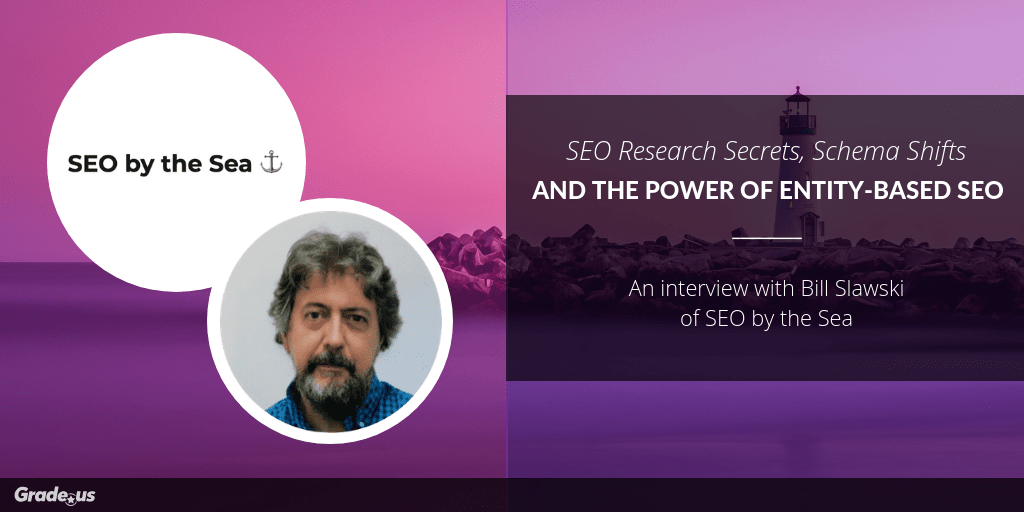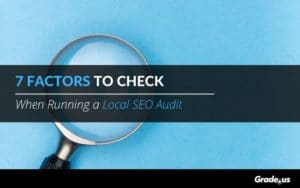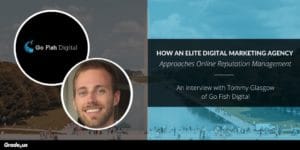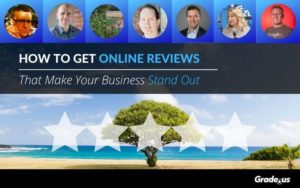All SEOs do research, but Bill Slawski, President of SEO by the Sea and the director of research at GoFishDigital, looks in places not everyone thinks to look. Where others might sit down with blogs and websites written by other SEO professionals, Bill goes straight to the source, mining patent requests for insights about what Google and other companies driving the world of search are up to. He does his own SEO research.
When you combine this strategy with his thoughtful, deliberate personality you get some killer insights. I was privileged to get the chance to sit down with Bill, and felt like I walked out of the conversation with quite the education.
Neither small business owners nor current SEO consultants and agency owners will want to miss what he has to say about SEO research, where Google is going, what it's already taking to rank well, and what it will take to rank in the future.
On the biggest misconceptions in the SEO industry
Carmen: So in your opinion, what's the current biggest misconception about the SEO industry, and how would you counter that misconception?
Bill: (starts laughing) I have trouble deciding where to start with that question. Ok, I'll jump in with this one.
There's an algorithm Google announced a couple of years back called "RankBrain."
And there are people who have written about RankBrain and say that there are ways to optimize web pages so they perform better with RankBrain. Even though people from Google have repeated over and over again that it's not possible. It just is a query rewriting approach.
It doesn't matter what's on your webpage. It's not going to rank any better or any worse under Rank Brain.
Carmen: Why do you think people are continuing to pursue that despite what Google says?
Bill: Because they're writing linkbait.
Carmen: Fair!
Bill: It's like, okay, if I can show people things they can do that improve the quality of their site, the quality of the copy on their pages, they'll maybe be led to think I'm actually doing them a favor, doing them something beneficial.
On the day-to-day of practicing SEO and SEO research
Carmen: What do you love most about SEO as a practice, and the industry as a whole?
Bill: I love doing the research and finding things that work well.
Carmen: And what do your day-to-day SEO-related activities look like, and how has that changed for you over time?
Bill: I spend a lot of time reading through patents and papers. I think as an SEO you're required to do a certain amount of research daily. Whether that involves reading other SEOs blog posts or Twitter streams about SEO or Google Blog Posts. I think, looking at some things like that are helpful.
Carmen: Are there blogs you recommend?
Bill: Well, without a doubt I would recommend the Google blog posts. Webmaster Central, the AI blog post. I think those are a good place to start.
Carmen: What type of person, besides being a good researcher, do you think thrives as an SEO specialist?
Bill: I think you need to be someone who pays attention to detail. I'm not saying that maybe in an obsessive way, but I think maybe it helps.
On SEO and Content Creation
Carmen: Let's talk about content for a minute. How can SEO specialists work with content creators to effectively achieve the goals of both practitioners, and are there things you wish content creators understood that they miss more often than not?
Bill: I think one of the fundamentals of creating content that's effective is knowing and understanding your audience as well as you can. That could involve finding where they gather on the web, doing some social listening, and social networks, talk interviewing people who work for your client. For instance, salespeople or customer service people, because they know what people ask for.
Carmen: Do you have any current favorite SEO tools that you recommend?
Bill: Google. Because people, I think, undervalue the importance of actually taking a keyword that you've selected, and looking it up and seeing what exists on search results pages for it.
Carmen: Do you think they're over-relying on the more gimmicky tools?
Bill: If the very top result is a navigational result, anything that is listed in search results below it may just never get clicked upon.
Carmen: Once you take that step, once you've done that, how do you take that and develop that into next steps for your client or the website you're trying to get to rank?
Bill: A client I worked with helped people incorporate businesses in the state of Delaware. And when they ranked at #2 in search results, they had higher conversion rates. The number one site that would rank above them would be the Delaware Division of Corporations, which was informational for people only and didn't let people incorporate their business.
It listed my client's business as one of the recommended incorporators. So having some idea of what the intent is behind sites listed in search results, whether they are informational, transactional, or just navigational helps you realize what you're competing with. If you're able to make your page both informational and transactional sometimes it may be helpful taking a page that's informational and putting a call-to-action on it and making it transactional too.
Carmen: I understand what you mean by an informational page and a transactional page, but when you're talking about purely navigational pages what are you talking about there?
Bill: I'm talking about queries people perform when they're not sure what the URL is of the page and they know the page exists.
Once upon a time ESPN used to be ESPN.goto.com, and it changed to ESPN.com now, but if I wanted to go to the ESPN website instead of typing the address in the browser, I would type ESPN in the search bar.
On SEO research and looking at patents and white papers for insights
Carmen: Got it! Now...what first inspired you to start pouring over all the patents and the white papers and how has your process and means of discovery of these resources evolved over time?
Bill: What really made a difference for me was I was still working with the incorporation business. I was in-house at the time. They were my only client. And geography made a difference to them. And showing up in queries with the words Delaware in them made a difference to them.
So I wanted to understand better how geographic queries worked. I decided to look at the patents because they're not marketing materials, they're intellectual property.
Companies protect their intellectual property and keep other companies from copying their processes by filing patents. And to file a patent you're engaged in a trade-off. You're making your process public. So you're getting protection, but you're also making it public.
So if somebody files a patent to protect something, they're not marketing it. They're explaining it in a way that makes it more likely than not that a patent examiner will approve of the patent. And if it's difficult to understand, that examiner won't approve of it.
So it should be easy to understand for someone who is engaged in the same art as the filers of the patent. So, when they explain what's in a patent they try to do it for other people who are working on building search engines. So the language of SEOs and search engineers isn't all that different if you do enough studying.
I found a patent that explained how geography could make a difference in SEO. So I applied things I learned from that patent to that client I was working with, and it did make a difference. So I started looking at more patents. So now I look at them every week, and I write about some of them. Because it helps me understand them. Trying to explain them to other people. If you can explain something to somebody else, you have some idea of what it says.
Carmen: Is this primarily Google patents you're reading, or are there others you look into?
Bill: When I first started off I was doing Yahoo patents and Microsoft, too. Now I'm mostly doing Google patents, though I started writing about a Microsoft patent earlier today. So I am still working more than just Google patents. I look at Apple patents too, and sometimes Facebook.
On Google's search engine testing, implementation, and progress
Carmen: Do you believe Google is always moving forward in achieving their goals? Or do you believe they've taken some steps back in delivering an optimal search experience?
Bill: I think they're really careful in how they test what they're going to do, what they're going to launch. Sometimes they may not roll out things they've decided they might.
But, recently, last month there were a bunch of updates from Google that people were claiming were a rollback of earlier algorithms, or earlier updates from Google. I think other people reported they had lost traffic to their sites. So people were both gaining traffic and losing traffic.
So it wasn't just a rollback of an earlier update that may have caused people losses in traffic. I think sometimes some of the things Google may change may affect some sites positively and other sites negatively. It's hard to tell though, because we don't get to see exactly what they're working on. And historically they have a record of making 2-3 changes a day to their organic search results.
So, I think I get some good insights by looking at patents but I can't be certain that the patents are the things that are causing the changes that take place.
And a lot of times when our website loses rankings, it's not only because of something the search engine's done. It's possible competitors hired better SEOs, than they have. Or people changed around the way they search. If you look at something like Google Trends it shows searcher interest in a term over time.
And people sometimes choose different words to search with. For the ideas and the terms they're searching for. So if you're in an industry where people talked about a certain product with a certain phrase, and they stop using that phrase to search and start using a different one, it would look like something wrong happened on your website when it's the searchers who changed, and not your website.
Carmen: Do you think given all these factors, do you think people panic or overreact too much to drops in traffic?
Bill: I think it pays off to be cautious and it pays off to pay attention to your audience. If you're in an industry, people within your industry start changing how they're doing things, and your audience starts changing how they search for things, you potentially have some problems. You've gotta pay attention. You've gotta be aware.
On SEO small business advice
Carmen: Switching gears a little bit, what insights would you provide to an agency offering SEO services to small business clients?
Bill: I'm not sure that I would offer too much advice to the agencies. It's the small business people I tend to be more interested in giving my advice to. The agencies should know better. They should have the experience.
But the small business people, if they haven't been in business online before, they don't know a lot of things. They don't know, for instance, that sometimes it can take awhile for a site to start. It's like if you have a brick-and-mortar store, and you just hung a sign and turn the "Open" light on, it's going to take people time to start coming in the doors.
Same thing happens with a website.
Carmen: Is that the first piece of advice you give to a business owner? To be patient? Or do you start somewhere else?
Bill: Patience is a good one. There are other ways of drawing attention to your business that don't necessarily involve your website. Owning a website is a good idea. There are businesses that don't own websites and don't rank in search engines except in local search. You can rank in local search without a website. I wouldn't advise it, but it's possible.
On the future of SEO, search engines, and search intent
Carmen: How do you predict search engines will continue to evolve their ability to determine search intent.
Bill: Ok, that's a good question. I wrote about a process that Google might go through where it takes pages, it scans through the pages and it tries to understand the entities or specific people, places, and things on a page, and often those are nouns, and proper nouns sometimes, that are capitalized. It will then try to understand different attributes related to those entities, different properties and key value pairs.
Like if it's a business, it might try to understand the address. The phone number. If it's a person, they might try to understand the profession. Other information about that person. This would all potentially be done in machine learning. Where it's understanding who these people, places, and things are, and it's collecting information about them.
Sort of like a Googlebot if it cared about facts. They're just following pages, links, and redirects.
Carmen: And as it understands these things better, who these entities are and what these pieces of information are, as it learns, what does that mean for the business that's trying to rank?
Bill: What that could mean is if a person searches for an entity using facts, asking questions about facts related to that entity, they may show up. It's no longer a matter of pagerank being the most important thing. Or which keywords you have on the page.
For instance, if you want to find a nearby Italian restaurant, that's an entity search. You're trying to find some place close. You're trying to find a restaurant that serves a specific type of food.
If you're looking for a movie, you just heard about a new movie by Marvel, with lots of superheroes, and you think it's being released soon and you wanna watch it, and you ask about that, just a nice conversational query, "When is the new Marvel movie coming out?" And Google may show you information about Avengers: Endgame, which I think is supposed to be released at the end of April. So you're asking questions about an entity.
Carmen: So, instead of...me having to put "Italian food" all over my website, now I can put spaghetti, lasagna, french bread, and Google now sees that and knows it's all Italian food?
Bill: It does, it does. There are other things you can do too. You name your restaurant something like "Carmen's Italian Restaurant." You use schema markup on your pages. Which identifies more about you.
To get the benefit of local search you submit to a number of local directories, information about your business. And you probably include that it's an Italian restaurant in those listings. Those will help you rank well for Italian restaurant. Just the corroboration of all that information about your business on the web is the type of thing Google takes notice of. And says, "This is an Italian restaurant. It's near a person who's searching. Let's show it to them."
Carmen: Speaking of schema, how do you think that's going to improve in the next few years?
Bill: It's providing new features. New ways to work with the search engines. It's extendable. It's something that can be upgraded. A new version just came out this week. Version 3.5, which added a number of features.
One of those is speakable mark-up. Which is as a site owner you identify a question and then an answer to the question you would spoken by a smart speaker, like a Google home. And that would be the type of thing you would answer. And you'd mark that up using schema.
There's another schema, it's an attribute schema. So there are schemas for specific professions like plumbers. And this new attribute is called "Knows About." If you have a plumber, you have website, you specialize in drain repair. You include in your schema, "Knows about drain repair." And that may help you be found when somebody is searching for a plumber to help with drain repair.
Carmen: That's cool stuff!
Bill: Yeah it is!
On how to improve Google's search engines and the future of the SEO industry
Carmen: Is there something you'd do to improve it if you had the ability to tell Google, 'Hey, add this feature?'
Bill: Schema is an open source project that...well, it's not open-source, but it's a project started by a number of search engines. Google, Yahoo, Bing, and Yandex joined later. It's an independent project. It's one you can sign up to be a member of their mailing list, where you can ask questions and you can provide suggestions.
You can sign up at the W3c website, to be a member of the schema community. If you are, you get emails, you're on a mailing list, that you can respond to. You can help develop the growth of schema in the future.
Carmen: I did not know that! Finally, how do you think the SEO industry is going to change in the next 5 years, and who do you think the winners and losers of search visibility are going to be?
Bill: One of the big changes, I'm talking about things like schema, I'm mentioning entity searches, so we're used to search engines using crawlers like Google Bot as web crawlers. They crawl pages from one link to another to another. And they find redirects and they do other things like that. And they index the content, the text on pages. We're going to start seeing Google Bot becoming more of a data miner. Where it tries to find those entities I was talking about. And information about them. And collect facts. Fact patterns. That's one of the big changes, I think we'll see in search that Google will get smarter. They started it in 2012 with the Knowledge Graph.
We're pretty much at a mix right now where we're helping people perform searches using keywords, and we're also helping people perform searches using entity information, and schema. Things like that. We're going to slide more towards the data mining and the entity type information in the future.
Carmen: So do you think people who get overly focused on keywords and don't realize that entity and schema is where it's moving, are they going to be left behind? Or is Google getting so smart it can kind of work around a small business owner's lack of understanding?
Bill: I think it can work around a small business owner's lack of understanding. Let me tell a really quick story.
I was working on the Baltimore Visitor's Center website. They wanted one page to rank well for the term Baltimore Black History. So we put the word on the page a couple of times. We tried to rank well for it.
There were too many other sites that were about Baltimore Black History. We couldn't get higher than around 100 in terms of rank.
So I talked to a copywriter I was working with and said, "Ok, create a walking tour of the city of Baltimore going from one landmark to another." There are landmarks. There are famous colleges, there are famous churches. There's a 9-foot tall statue of Billie Holiday.
So we created this walking tour. And in the space of about three months or so it became the sixth most visited page on that site. That was a 300 page site.
We focused upon the entities. We focused upon Billie Holiday and Frederick Douglass. Other people. The places. The churches. The names. Entities rather than keywords. Trying to rank for Baltimore's Black History wasn't doing it for us.
Carmen: That is a great case study! That explains that entire concept well, so I appreciate you sharing that.
You can visit Bill's blog by heading to www.seobythesea.com, or follow him on Twitter at @bill_slawski.
About the Author
Raney C. Hudson
Raney C. Hudson is an independent content consultant with a 10+ year track record in the digital marketing industry.











